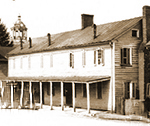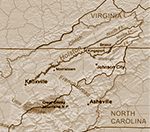from The Business Journal of Tri-Cities Tennessee/Virginia,"Old Deery Inn reflects early prosperity: Historic Blountville hotel was business hub during late 1700s, early 1800s," by Kara Carden
If it's fair to judge a hotel by it's guest list, Blountville's Old Deery Inn must rank right up there with the best.
After all, no modern franchise can boast as many presidents, governors, and other dignitaries as the Old Deery. Andrew Johnson, Andrew Jackson, James K. Polk, William McKinley, William Blount, John Sevier, Marquis de Lafayette, and, most recently, Jimmy Carter have all traversed the thick oak floors of the 200-year-old Inn. And it's even said - by the most reputable sources, of course - that a future King of France stayed there before taking the throne.
The service must have been really good.
The atmosphere must have been great, too, considering a mere description of the place lured its first permanent resident all the way from Baltimore. William Deery, an Irish immigrant who travelled the country as a peddler, had the good fortune of stumbling upon the first owner, James White, in that colonial city in 1787. Intrigued by the description of the house, which wasn't even completely finished, and his own memories of trading in Tennessee, he accompanied White back to Blountville and promptly bought the house and lot.
Smart move, because it was from here that Deery made his fortune. Before he died, he had amassed general stores in Blountville, Columbia, Fayetteville, Shelbyville, and one in Pulaski, Va. A lavish lifestyle resulted, which included legendary spending sprees such as the one he enjoyed in 1821: He purchased nine teams of horses, eight stagecoaches, and 44 horse teams. At one point, he even bought a steamboat and sailed it up the Holston River into Kingsport. He was the wealthiest man in the county.
Deery not only accumulated wealth in Sullivan County, he gained a wife, too. Elizabeth Alison, whose mother, Martha McKinley Alison, was a cousin of President William McKinley, bore him three sons and two daughters whom they raised at the Old Deery.
They eventually built onto the house and converted a portion of it into an inn for traders, travellers, and the occasional dignitary. At one point, he also opened a post office and a store on the property. Today, a vivid clue of the types of trade that took place in the store is visible. A feather tick hole is still in the floor, which held the cloth that feathers were dumped into from the chickens customers used to barter for goods. When the tick was full, it was pulled out of the hole and sewn up into a mattress, which would also be sold.
Today, the structure consists of three sections: The two-story hewn log house, the two-story frame store building, and in the rear, a three-story stone house. There are 18 rooms, three sets of stairs, two attics, three and a half bathrooms, three cellars, and seven fireplaces.
Ten historic outbuildings were also added to the property by the most recent owner and resident, Virginia Byars Caldwell, widow of Judge Joseph Anderson Caldwell. There is a James King hewn log house which was first used at the old Beaver Creek Iron Works near Bristol, a Hawkins County "Granny House" made of logs so huge that only four logs complete a side, an old log springhouse, and a white frame Blountville lawyer's office. In addition, Mrs. Caldwell also installed a set of iron gates from her father's farm that originally hung at the United States Capitol Building. These date from 1875 or earlier.
The Old Deery Inn remains a testimony to the prosperous beginnings of the region - and a reminder of the famous people who visited it.





